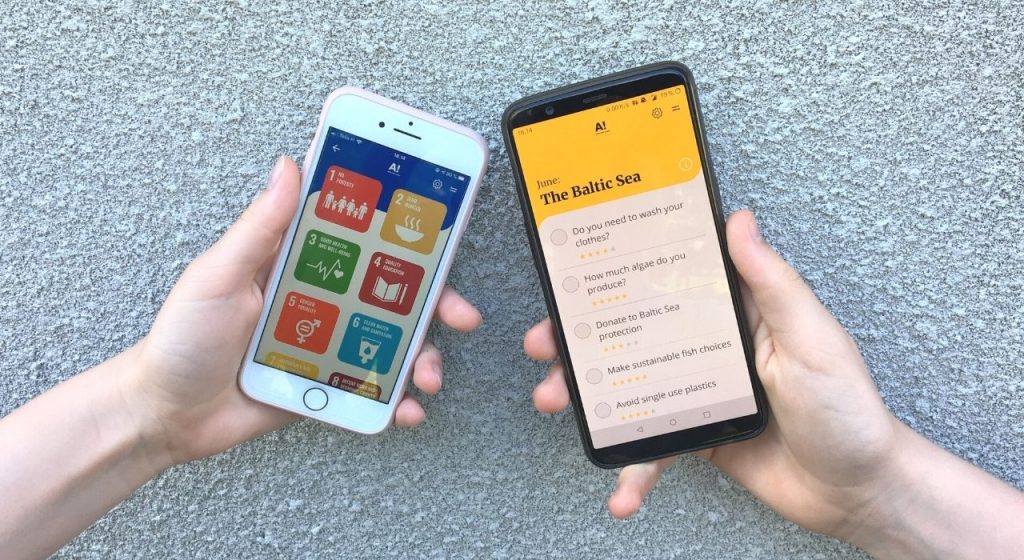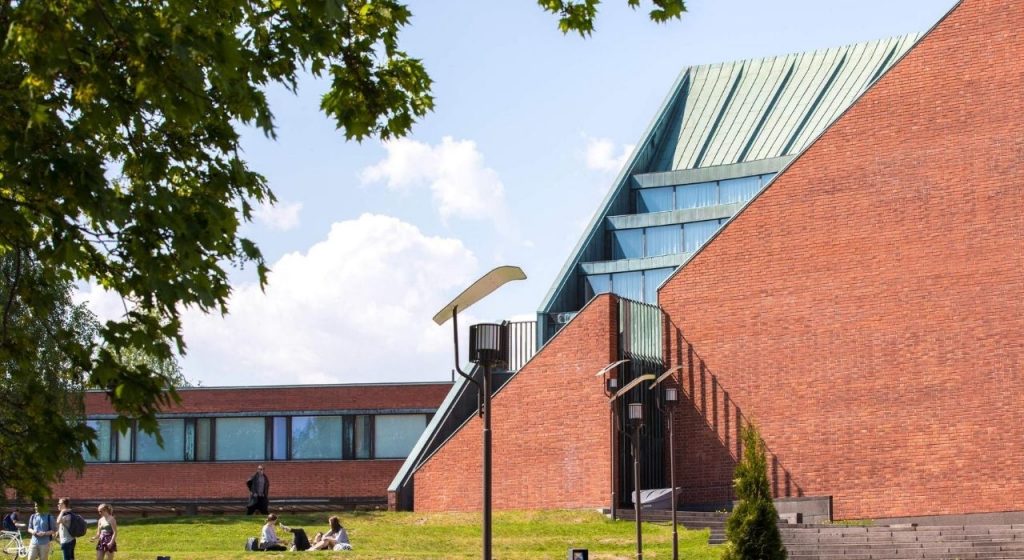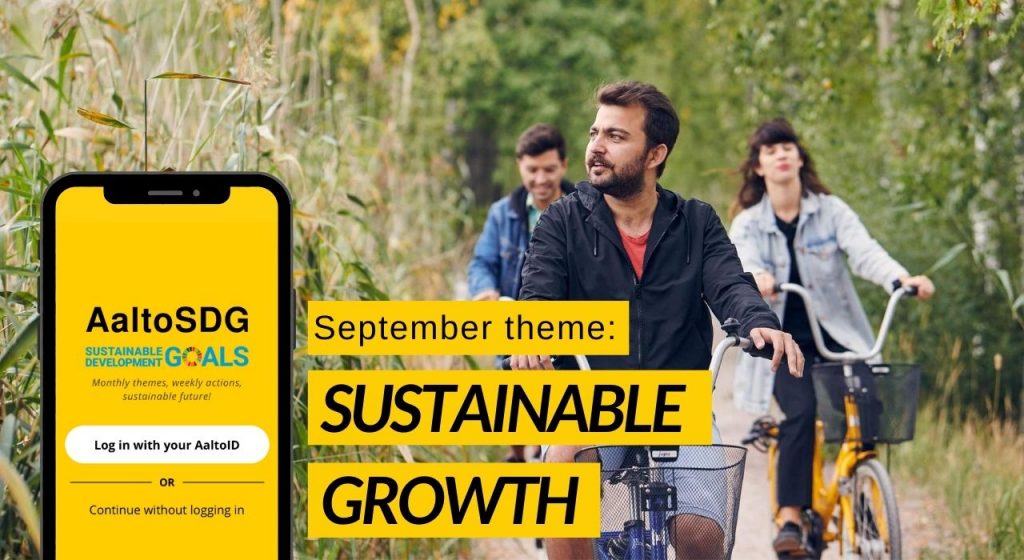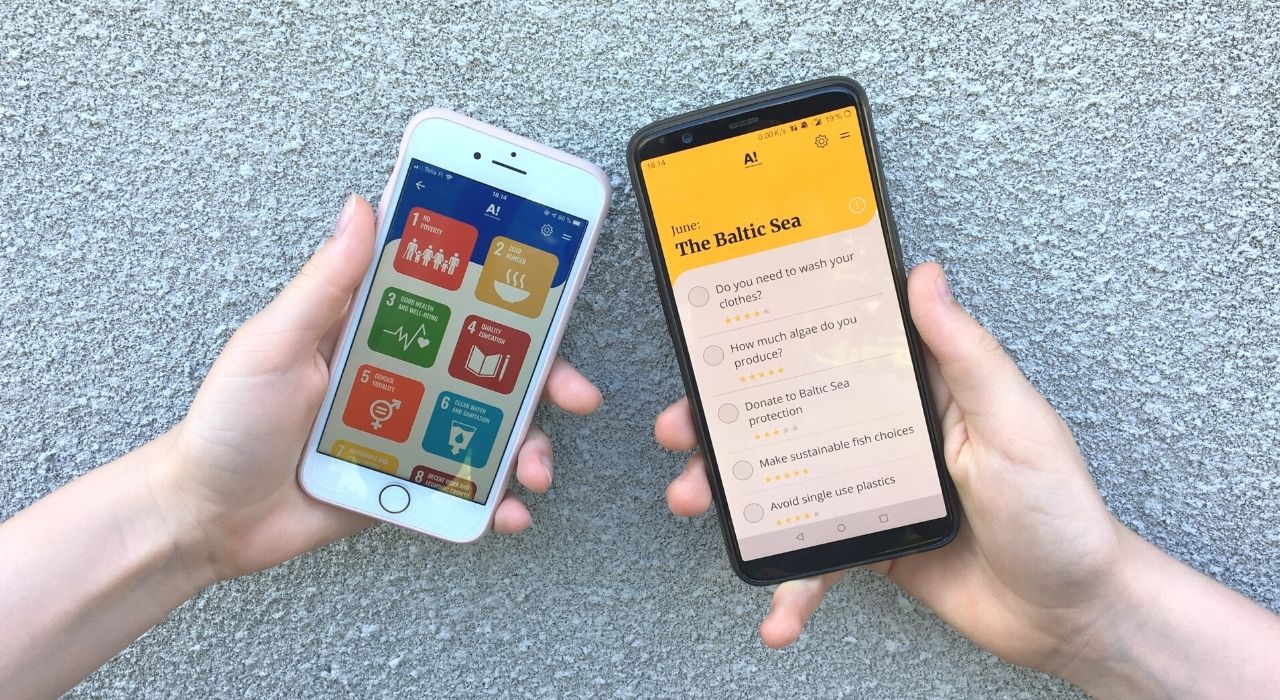Individual change is necessary to tackle sustainability challenges effectively. At Aalto University, we have developed a new app, AaltoSDG, in order to encourage its users to contribute to the UN Sustainable Development Goals by taking individual action and pushing for systemic change.

How to increase awareness about the impact of the decisions that we humans make every day? And more importantly, how to trigger behavioural change for a more sustainable future? While nobody dares to dream of a panacea that would nudge all people to make sustainable choices, the need for new ways to raise awareness, offer facts and encourage action is as urgent as ever. Aalto University’s mobile application, AaltoSDG, is doing all this by offering tips for an everyday life that is aligned with the UN Sustainable Development Goals (SDGs). E.g. in Finland 66% of the consumption-based emissions come from the consumption of individuals.Therefore, empowering individuals to shift towards a more sustainable everyday is now as important as ever.
Making Aalto University’s sustainability work visible
In 2018, Aalto University signed the SDG Accord as the first university in Finland. By signing the global accord for universities, Aalto committed to advancing SDGs in teaching, research and campus development. To turn the commitment into action, Aalto University needed ways to make their SDG work visible and more enticing for the Aalto community to participate in.
To meet these needs, one solution was sought through an innovation partner procurement method, a form of public procurement that became available in 2018. The university wanted to find a partner with whom to build a digital solution that collects all SDG-related work in one place, whilst ensuring visibility, community engagement and individual behavioural change. Through the innovation challenge, Aalto partnered with Geniem to create a mobile application. The AaltoSDG app was launched in January 2020 and has now more than 1200 downloads.
The content of the AaltoSDG app is strictly research-based, and it can be seen as a novel way of communicating research to broad audiences. Providing references to trusted literature gives the users a model of critically scrutinizing the sources of information and basing their actions on knowledge, instead of beliefs.

Why are individuals so important to change?
Behavioural change necessitates both motivation and cognition, the will and the way to do the change. According to studies, four types of behavioral barriers exist that prevent members of a campus community to act sustainably: communication/awareness, inconvenience, financial concerns and lack of engagement. All too often these barriers are translated into countless counter arguments against changing our system and behaviour: “The BRIC countries aren’t doing anything to combat climate change, why should we?” or “It is too difficult and expensive – we have more pressing issues!”
All of these arguments shift blame and excuse us from changing. However, the current pandemic has shown that most of us are in fact willing to change our behaviour, practices and even laws when the urgency is acknowledged and accepted. Change and especially individual change in our behaviour is essential in creating a positive impact in the world.
The AaltoSDG app attempts to incorporate all these: spread the word about why change is urgent and give suggestions on how to actually do it. AaltoSDG app encourages and gently nudges users to make sustainable choices in their everyday life. It aims to be a counter force to sustainability guilt through positive feedback: making action visible and showing the aggregate impact of the choices made by the community of users.
Why make another app?
Worldwide mobile applications are an increasingly popular means for promoting sustainable development. Their focus varies from concentrating on certain topics (recycling, climate action etc.) to games and from challenge based actions to event apps. However, so far AaltoSDG seems to be the only sustainable lifestyle focused app within the university context. But are there (dis)advantages of an app, when communicating sustainability issues? Why another app to get lost in the sea of thousands and thousands of other apps?
First, an app can be used in a highly flexible and reactive way, especially in terms of content, as topical events and issues can be easily incorporated in the content. For example, during the COVID-19 lockdown, all AaltoSDG actions were doable from the safe zone of the users’ own homes.
Second, user feedback can instantly be incorporated in the content. One central focus point in AaltoSDG’s content creation has been balancing out bigger, more abstract actions that aim to advance systemic change with smaller and easier individualistic actions. It would seem that AaltoSDG users prefer easy and individualistic actions. Moreover, users have been reluctant so far to participate in actions that involve communication with other people. These statistics have helped to guide the app’s content production. There are difficulties in utilizing an app as well. During the pandemic lockdown, marketing the app has become more difficult. Is digitalization still dependent on encounters in real life and marketing with physical objects like flyers? Or can it be that the information flood due to the intensive coverage on the virus has decreased people’s willingness, interest or even ability to receive online messages?

Take action
Individual action and behavioural change is highly necessary e.g. for tackling climate change. To create momentum for change, we need positive messages and encouraging platforms that inspire people to make the necessary shift. Join the change and get empowered by AaltoSDG.
Monthly themes, weekly actions, sustainable future!
#AaltoSDG @aaltosdg @AaltoASH @aaltouniversity
Paula Schönach
Paula Schönach is senior advisor in sustainability at Aalto Sustainability Hub. Favourite AaltoSDG action: “Plogging” (collecting litter) – the perfect outdoor workout and still happy about the heart-warming, positive feedback by random passers-by.
Aino Saarelainen
Aino Saarelainen is master’s student in business, AaltoSDG trainee. Favourite AaltoSDG action: “Try urban gardening” – it can be as easy as sprouting beans on your windowsill!
Emma Sairanen
Emma Sairanen is master’s student in biotechnology, Aalto Sustainability Hub trainee. Favorite AaltoSDG action: “Give it a try” – testing out new plant-based protein sources is a smile inducing adventure.
Photos by: Aalto Sustainability Hub

